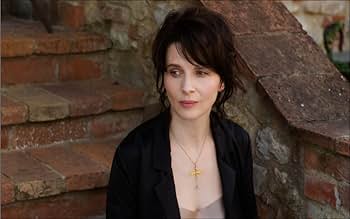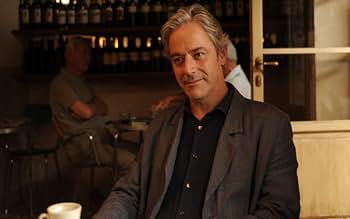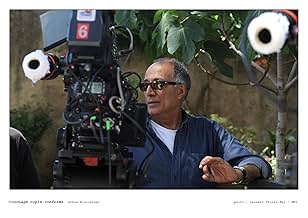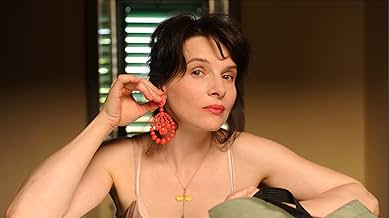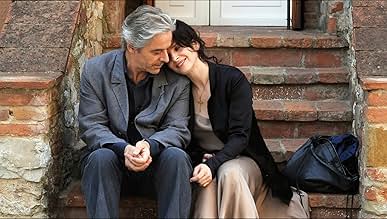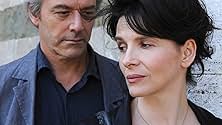Copie conforme
- 2010
- Tous publics
- 1h 46min
De passage en Toscane pour promouvoir son dernier livre, un écrivain britannique d'âge moyen rencontre une Française qui le conduit au village de Lucignano. Là-bas, une question fortuite rév... Tout lireDe passage en Toscane pour promouvoir son dernier livre, un écrivain britannique d'âge moyen rencontre une Française qui le conduit au village de Lucignano. Là-bas, une question fortuite révèle quelque chose de plus profond.De passage en Toscane pour promouvoir son dernier livre, un écrivain britannique d'âge moyen rencontre une Française qui le conduit au village de Lucignano. Là-bas, une question fortuite révèle quelque chose de plus profond.
- Réalisation
- Scénario
- Casting principal
- Récompenses
- 11 victoires et 29 nominations au total
- Le marié
- (as Filippo Troiano)
- La mariée
- (as Manuela Balsinelli)
Avis à la une
They stop in a museum before the picture of a portrait, thought for centuries to be the original, though lately discovered to have been only a perfect copy. What value has changed in this object, what new perception now regards it, this is where I believe this is best unraveled.
Things change the man quips philosophically, an intellectual much like Kiarostami perhaps. Yet we see the same cypresses standing by the same old road, the same plazas and hotels they once visited, then young and booming with love. Having spoken so well, we see however that the man understands little of that. He can't even enjoy a simple glass of wine without complaining that it is corked, what should be a simple pleasure is tainted by the gross irritation that comes from too much satisfaction. Having satisfied our desires so many times, in so many different ways, we can see that we are no closer to happiness.
Where does this weariness then, born from too much familiarity, from having seen or tasted too much, come from and why does it invest our gaze with this constant dissatisfaction? Another line of thought to connect the web of allusions. The woman, who has made herself beautiful for him in the day of their anniversary, says he doesn't see her anymore. He looks at her but doesn't see, meaning something has dissipated with time, grown withered in his eyes, though she is still the same, except a little older.
Kiarostami perfectly visualizes the burden that saddles these people in the scene where they are driving around town in the car. On the windshield we see cast over their faces the reflections of buildings gliding by, not simply the gap that exists between them, indeed between any two human beings, but the burden of time, life passing them over. In a poignant metaphor, we see them move through existence.
A perfect copy, the original, two identical objects which we are taught to perceive differently. The lines being the same in the same places, the hues of color painted exactly the same, the one intrinsic value that separates the two is merely time. Which is to say that as humans, who wither away with time, we allow ourselves to regard it as the most precious good, the one we cannot buy or sell. The movie shows us how, although we may understand our transience as an idea, we live as though we will always be here, as though we have time enough to postpone a small gesture of affection.
But if we simply perceive the world around us, this present moment? This draught of air now coming from an open window or this glass of wine? Or indeed this woman who has made herself beautiful for us?
This is a great film by one of the few gifted filmmakers of our times, perhaps his first truly great one. In the right ears, this will be a sutra that will permit us to meditate on fundamental precepts of existence, how time thought to matter matters little, how craving and ego blind us. How ultimately, like a mandala upon which Tibetan monks work tirelessly day and night only to destroy it upon completion, life is to be lived in full, with knowledge that it will come to pass.
The film forces us to wonder to what extent the relationship between the two central characters is real, or an imitation of a once real relationship. It asks is a real relationship any better than a certified copy i.e a fake relationship where both parties pretend it is real. That is the central question - the value of the authentic versus the value of the fake.
It's really enjoyable with unexpected progress of the story (unexpected especially if you're brainwashed by certain type of movies about male-female relationships). It has room for interpretation, everything is not explained and it lets the viewer bind the remaining threads. It's also funny and I found it quite intense. It held my attention and actually felt about ten minutes shorter than it really is. I have to admit that I'm a big fan of intelligent movies about male-female relationships. Long well written and acted scenes with just a man and a woman talking don't turn me off.
The formal control of the shots by the director and the cinematographer are masterful. There are those long shots that Kiarostami has used before, but used masterfully in the context of the story, and not in any "look at me, Mom, I'm sculpting in time" -art house tedium.
I talked with couple other persons who saw the movie, and they said that they didn't like it. But let me tell you that it's really good.
Not entirely convincing, but an excoriating watch nonetheless. When this film was finished, I felt like I had just witnessed an entire relationship, from the first fruitful seeds, to infatuation and love and friction and wear and decay, and in a sense I had because that is essentially what the two characters of the film take us through. The film begins with William Shimell, playing the role of modest and charming British academic who is promoting his book in Italy. The idea of this book gives the film its title and what the whole film begins to play around with: the copy. The copy, and it's relation to the original, its authenticity, and whether one should invest any time in an original if a recreation is believable. He would answer 'no' to that last thought. Juliette Binoche appears at his speech, leaves his translator a note, and the next day he appears at her small museum/exhibition/trinket shop, artistic debate is continued, and thus their journey begins. The boundaries of conversation between two people who are seemingly strangers soon dissolves and they are soon fluctuating between moments of bitterness, delight and contemplation, and soon enough in what appears to be a bizarre role-play, the assume the role of a married couple and any façade that they try to wear is soon being flayed.
Binoche is utterly captivating and her award for Best Actress at Cannes is entirely deserved. She is seemingly inexhaustible, communicating in Italian, French and English and losing no degree of vulnerability, bitterness or magnetism between the languages, and she has a remarkable way of kind of softly inhabiting any given situation but being able to turn caustic and uncomfortable with immediacy. There are moments when the characters are sitting opposite each other in conversation and they are speaking directly into the camera, and when Binoche does this it's never less than transfixing.
Shimmel, for a first time actor is for the most part quite grounded and reserved, but it's with him that the film often feels at its flattest. He's the more outwardly ruminating intellectual, always approaching things with a contemplative thought, and it often feels like the film is struggling to maintain a deep thought, as if in fear of being mocked for being nothing less than poetic. Maybe that's the way the character is supposed to be, but all his affectations get tiring. He comments on Eucalyptus trees being so totally unique, how each one has its own shape and definition and being unlike the other one, and as truthful as it might be, it's just a comment that leaves you thinking 'And?' At other times the exchanges of these characters are scintillating, as when an innocuous pit-stop at a café becomes changes the gears of their relationship, and Binoche begins to furiously criticise his cool, charming bullshit-masquerade. The dialogue operates in these two modes, between fascinating and questionable, but never really finds its footing.
Abbas Kiarostami is clearly a man who knows exactly what he wants to do and how to do it, and at the jolly age of 74 all the wisdom and joy and despair he must have accumulated in his lifetime can be felt here, in the vivaciousness and the bitterness of the characters, in the way a camera can just sit and stay trained for minutes on end and let the people unfurl themselves, but sometimes it feels like all he is trying to much to do justice to all his collected experience in life. There's a shot toward the end with our couple standing in a courtyard together and just in front of them is a far older couple, man and wife, standing on the same side of each other, tentatively walking and supporting each other. The imagery is obvious but the connotations are beautiful, and it's the sort of a shot that could only have worked as aposiopesis to the journey preceding it. (Maybe that is the point)
So there was an ambivalence I felt throughout the film, but it's hard to dismiss something this lovingly made, as an expression of the melancholy of our relationships in life. There's a blustery and picturesque feel throughout this Italian journey that is hard to argue with.
Le saviez-vous
- AnecdotesDuring a visit in Tehran by Juliette Binoche, Abbas Kiarostami told Binoche the synopsis of Certified Copy as a casual anecdote, which she said that she fully believed until he confessed to having made it up. According to Kiarostami, studying the reactions of Binoche as she listened to the story was a vital part of the film's further development.
- Citations
James Miller: It seems to me that the human race is the only species who have forgotten the whole purpose of life, the whole meaning of existence is to have fun, to have pleasure. And here is someone who's found their own way to do it. We shouldn't judge them for it. If they're happy and enjoying life, we should congratulate them, not criticize them.
- ConnexionsFeatured in Breakfast: Épisode datant du 31 août 2010 (2010)
- Bandes originalesO surdato 'nnamurrato
Written by Aniello Califano (as A. Califano) and the music by Enrico Cannio (as E. Cannio)
Meilleurs choix
- How long is Certified Copy?Alimenté par Alexa
Détails
- Date de sortie
- Pays d’origine
- Sites officiels
- Langues
- Aussi connu sous le nom de
- Certified Copy
- Lieux de tournage
- Sociétés de production
- Voir plus de crédits d'entreprise sur IMDbPro
Box-office
- Budget
- 7 000 000 € (estimé)
- Montant brut aux États-Unis et au Canada
- 1 373 975 $US
- Week-end de sortie aux États-Unis et au Canada
- 77 937 $US
- 13 mars 2011
- Montant brut mondial
- 7 736 632 $US
- Durée
- 1h 46min(106 min)
- Couleur
- Mixage
- Rapport de forme
- 1.85 : 1




